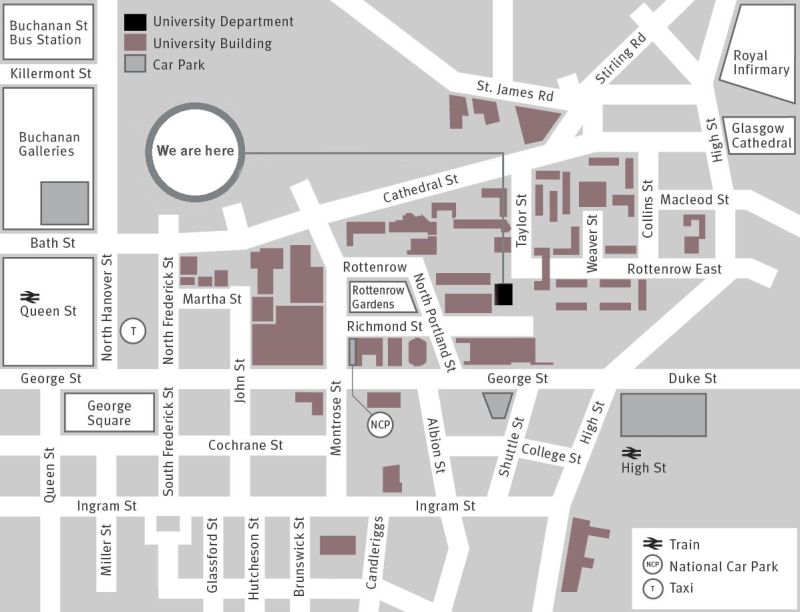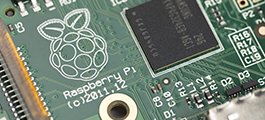Raspberry Pi Day
12th December 2015 - 10am to 4pm
The Department of Physics at the University of Strathclyde is hosting a Raspberry Pi day. Entrance is free, but places are limited, so please reserve your place using the link on the right hand side.
We hope to repeat the success of the Raspberry Pi day in January this year, where over 120 attendees enjoyed learning about and tinkering with Raspberry Pis.
The Raspberry Pi
The Raspberry Pi is a credit card sized computer, designed to improve computer programming knowledge. It is a low cost but capable device that can be used by people of all ages to learn about computing. It connects to the Internet, plays HD video, and can be installed with a variety of operating systems.
The Raspberry Pi supports a multitude of applications and development tools - like Scratch which is designed to teach programming concepts to young people. The Raspberry Pi also makes it easy to connect to external sensors and electronics, allowing it to be incorporated into a wide range of projects, such as robots, games consoles, network routers, spacecraft, weather stations and more.
Computer programming is a key skill in today's world. It's used everywhere, from optimising the way car engines function, controlling aeroplanes in flight, designing precision components, to modelling complex systems like the weather. However computer programming is a skill that needs to be learnt and practised - experience programming, and solving problems with computers, can greatly enhance career opportunities for students and employees.
Outline
The Raspberry Pi day is an event for all levels of ability and involvement. We want it to be a day for parents and children, educators and pupils, students and makers to share their enthusiasm and knowledge for programming and computing fun.
During the day, there will be:
- Talks covering the basics of the Raspberry Pi, as well as programming and electronics applications
- A hands-on lab area, with Raspberry Pis available for interactive investigations and demonstrations (example code available)
- Space for guest projects too
Agenda
| Time | Title | Speaker | Abstract | Level |
|---|---|---|---|---|
| 10:00-10:20 | Introduction | W.H. Bell | An introduction to the Raspberry Pi and the objectives behind the device. | Beginner |
| 10:30-10:50 | Linux and Bash introduction | W.H. Bell | Linux commands, Bash programming and system administration are discussed at the beginner level. This starts with opening a shell session, discussing basic Linux commands, and basic Bash scripting. | Beginner |
| 11:00-11:20 | The Internet of Things, Node-RED and the Raspberry Pi | Martin Evans | Node-RED is a Node.js based visual tool for wiring together hardware devices, APIs and online services in new and interesting ways. We will cover: Setting up Node-RED on the Raspberry Pi using The ThingBox, wiring up simple sensors and outputs, and connecting to a cloud service. | Advanced |
| 11:30-11:50 | Working from a boat in the Bahamas | Aaron Bassett | Most development teams rely on a variety of SaaS (Software as a Service) products to work effectively with each other. We use Github to share code, Pypi, npm and gems to handle dependencies, and Slack to decide who's turn it is to make coffee. But what if you lost access to these tools? In this talk I'll discuss how I built an offline development server so I could still work effectively while sailing on a boat in the Bahamas. | Advanced |
| 12:00-13:00 | Lunch break | |||
| 13:00-13:20 | Python Games with Pygame Zero | W.H. Bell | Computer game programming with Python and Pygame is introduced using Pygame Zero. A simple example program is discussed and then expanded to produce a complete arcade game. | Intermediate |
| 13:30-13:50 | Using the Raspberry Pi to learn real-time embedded programming | Bernd Porr | The Raspberry Pi is an ideal platform to teach the interplay between low level data acquisition and high level GUI user interaction. Realtime embedded programming can be a daunting task, having to write software in a multi-threaded way that caters for different sampling/refresh rates. However, with the help of the QT environment, this becomes a very easy and fun task. | Advanced |
| 14:00-14:20 | Penetration Testing with Raspberry Pi | Martin Goodfellow | Penetration testing is the practice of testing a computer system, network or Web application to find vulnerabilities that an attacker could exploit. This talk will look at how you can turn your Raspberry Pi into a portable penetration testing drop box running Kali Linux. It will also demonstrate the danger of submitting sensitive information via untrusted public networks. | Intermediate |
| 14:30-14:50 | Connecting to electronics | W.H. Bell | A basic introduction to input/output connections on the Raspberry Pi is given, covering simple logic, PWM, SPI and I2C interfaces. The general pitfalls and solutions for a range of problems are discussed. | Beginner |
| 15:00-15:20 | Using the Raspberry Pi in our afterschool club | Amanda Wilson | For 2 years the afterschool computing club at Royston Primary have been undertaking various activities. One of the most popular things undertaken is working with the Raspberry Pi from starting off in Scratch through to programming Minecraft with Python and a few things in between. This talk will give you an insight into how we've grown and how you can make the most out of your own Raspberry Pi. | Beginner |
| 15:30-15:50 | Deploying the Raspberry Pi in schools | W.H. Bell | Typical classroom usage of the Raspberry Pi computer is discussed. Suggested network configuration, software maintance and pupil project file collection solutions are outlined. | Beginner |
Talks will be 10 minutes long, to allow the remaining 10 minutes for discussion.
Location
The event will take place within the Department of Physics at the University of Strathclyde, which is within walking distance of Queen Street railway station and Buchanan Street underground station.
Entrance for the event is from the 4th floor on the north side of the building, off Rottenrow.
Google Maps
Department of Physics,
John Anderson Building,
107 Rottenrow East,
Glasgow, G4 0NG

